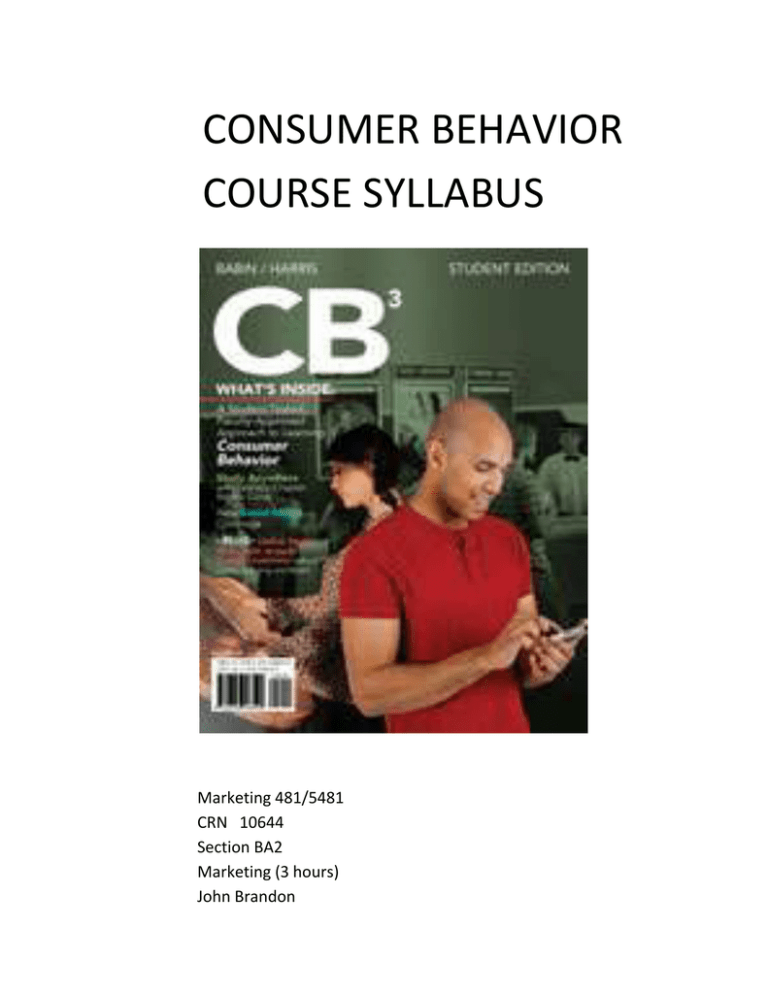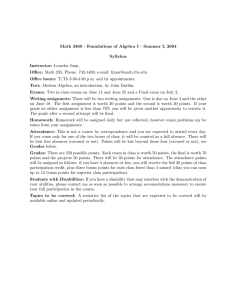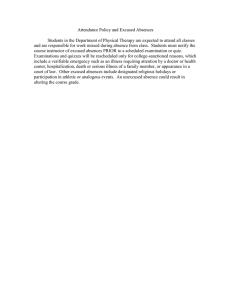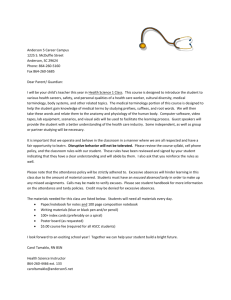CONSUMER BEHAVIOR COURSE SYLLABUS Marketing 481/5481
advertisement

CONSUMER BEHAVIOR COURSE SYLLABUS Marketing 481/5481 CRN 10644 Section BA2 Marketing (3 hours) John Brandon TABLE OF CONTENTS IMPORTANT INFO ........................................................................................................................................... 2 COURSE DESCRIPTION .................................................................................................................................... 2 COURSE RATIONALE........................................................................................................................................ 2 COURSE OBJECTIVES ....................................................................................................................................... 3 ACADEMIC INTEGRITY ..................................................................................................................................... 3 ATTENDANCE REQUIREMENTS ....................................................................................................................... 4 DROP DATE ..................................................................................................................................................... 4 GRADING SCALE .............................................................................................................................................. 4 METHODS OF INSTRUCTION ........................................................................................................................... 5 COURSE REQUIREMENTS ................................................................................................................................ 5 HOMEWORK CASES ......................................................................................................................................... 5 CB PROJECT ................................................................................................................................................... 5 TESTS ............................................................................................................................................................ 5 CLASS DECORUM ............................................................................................................................................ 5 1 IMPORTANT INFO Time: Monday and Thursday evenings from 7:50 P.M. until 10:00 P.M. Where: Self Hall – Room 202 (subject to being moved) Instructor: Mr. John Brandon Contact: Mississippi Development Authority Woolfolk State Building (corner of High & Northwest Street) 4th Floor Post Office Box 846 – Jackson, Mississippi 39205 Office Telephone: (601) 359-2399 (voice mail is acceptable) Office E-mail: jbrandon@mississippi.org Cell Telephone: (601) 862-1808 (voice mail is acceptable; NO calls after 10:00 PM) Home E-mail: johnmbrandon@hotmail.com Mississippi College E-mail: Brando00@mc.edu Textbook: CB3 (3rd Edition); Babin, Barry J. – Louisiana Tech University, Harris, Eric – Pittsburg State University; Southwestern Publishers – Cengage Learning; Published 2012; 384 pages; ISBN #0840058519 or ISBN #9780840058515 COURSE DESCRIPTION Consumer Behavior is a course about the processes involved when people select, purchase, use, and dispose of goods, services, ideas and experiences. This course examines the strategic implications of the internal, external and decision-making factors that impact consumer purchasing patterns with emphasis on managerial applications. COURSE RATIONALE The field of consumer behavior is one of the most intriguing and important fields in the social sciences. Dr. Michael Solomon of Auburn University perhaps summarizes it best: “In many courses, students are merely passive observers, learning about topics that affect them only indirectly, if at all. Not everyone is a plasma physicist, or a medieval French scholar, or even an 2 industrial marketer. We are, however, all consumers. As a result, many of the topics dealt with in this course are of both professional and personal relevance to the student. . .” An adequate understanding of consumer behavior is essential for the prosperity of any marketing enterprise, whether it be selling home computers, providing legal services, supplying industrial chemicals, running for political office, promoting a musical group, marketing a document duplicating service. Working in an area that is so critical to almost every business activity brings a high degree ot excitement and a justifiable sense of importance. Consumer Behavior is a required course for marketing majors and fulfills the requirement for a Marketing elective at the 300 or 400 level. COURSE OBJECTIVES The overall goal of this course is to provide students with a thorough understanding of the internal and external factors that influence consumer behavior, and to develop an appreciation of the importance of consumer behavior in marketing and in today’s business world. Therefore, your major objectives for this course as follows: 1. 2. 3. 4. 5. 6. To learn about the consumer decision –making process and its implications for marketers. To understand the major psychological influences on consumer behavior and their practical significance. To discern how individuals and groups influence consumer behavior, and how marketers utilize this knowledge to help achieve organizational objectives. To comprehend the role of cultural norms and values in consumer behavior.. To gain a better understanding of consumer and marketer ethics and ethical issues surrounding consumer behavior. To integrate and apply the concepts learned in the course through experiential activities and assignments. ACADEMIC INTEGRITY Academic integrity will be expected from all students in every endeavor. Further, students at Mississippi College and in this class are expected to be scrupulously honest. Dishonesty, such as cheating or plagiarism, or furnishing false information, including forgery, alteration or misuse of College documents, records or identification, will be regarded as a serious offense subject to severe penalty, including, but not limited to, loss of credit and possible dismissal. Guidelines regarding the responsibility of students in the areas of academic honesty, plagiarism, and cheating may be found in the 2011-2012 Mississippi College Undergraduate Bulletin and in the Tomahawk (the Student Handbook). You will find reference to Policy 2.19. Both of these publications are available on the university website or from the Vice President of Academic Affairs office or you may download it directly at: http://mc.edu/resources/publications/handbook/20112012Handbook.pdf. Due to a recent increase in cheating in the School of Business, increased security will be take place during exams including (but are not limited to) separating students, using cover sheets, or allowing students to keep any electronic devices. Be prepared. You will not be allowed to take the exam if you do not comply. 3 ATTENDANCE REQUIREMENTS Class attendance is required and accurate records of attendance will be kept. Cumulative absences may result in a lowered grade or loss of credit for the course. While every effort should be made to attend class, a limited number of absences may occur. Whether an absence is excused or not, the student is responsible for the material covered, assignments given and the learning that took place during the absence. Tardiness is also subject to penalty; as is any failure to complete required class work on time. Any student coming to class after it begins will be considered tardy for that class. Any student leaving class before it is completed for the evening will be considered tardy. A student who accumulates four (4) tardy notices will receive one (1) absence. Any student who is absent from class more than three (3) times, whether excused or unexcused, will receive a grade of “F” in the course. A student registering late will be charged for all absences occurring prior to his/her reporting to class, although these may be treated as excused absences. Appeal – If a student is absent more than 4 class periods as specified in university policy found in the Tomahawk and in the 2011-2012 Undergraduate Catalog and believes that there is a reasonable explanation for the absences, he/she may appeal the absences to the Dean of the School of Business. Students may obtain a Student Absence Appeal Form from the Dean’s office. DROP DATE Students should be aware the drop date for this course November 18, 2011. This is the last day students can drop this class or withdraw academically. GRADING SCALE A: 91 – 100 B: 81 – 90 C: 71 – 80 D: 61 – 70 F: 60 and below 4 METHODS OF INSTRUCTION This course will utilize lecture and class discussion. Students will be expected to read the textbook, understand the materials and be prepared with homework as assigned. The student will also be given examinations of assigned work. COURSE REQUIREMENTS HOMEWORK CASES: Each student is expected to review the course materials before class. Homework cases will be assigned during several class periods. Each homework case will be graded from 1-100 points. There will be NO makeup homework. The total number of points received will be divided by the total amount of homework given to get an average homework score. (25% of grade) CB PROJECT: Each student will have an opportunity to work on a semester project. This project will involve application of the concepts learned during the course. Students will be given the opportunity to work individually or in small teams on the project. However, each student is expected to turn in his/her own work. The project will be graded from 1-100 points. There will be NO makeup after the due date. (25% of grade) TESTS: There will be two (2) tests or examinations of course materials given. Each exam is designed to determine the student’s ability to understand the concepts that were discussed in the classroom. Each student should take both tests. There will be NO makeup exams. If a student is unable to take any test, it will result in a test grade of zero (0). The exam schedule is: Test #1 Monday, November 14 - Chapters 1 thru 10 (25% of grade) Test #2 Monday, December 12 - Chapters 1 1thru 16 (25% of grade) CLASS DECORUM Until proven otherwise, it is assumed that all students in this class are adults and act accordingly. That includes respect for fellow students. Students are expected to behave as ladies and gentlemen including, but not limited to, the following: No talking out of turn. No disruptive behavior. No cellular devices on during class. No extra materials brought to class. No hats/improper apparel. No food or drink is in the classroom. The instructor reserves the right to make any and all needed changes during the semester 5


